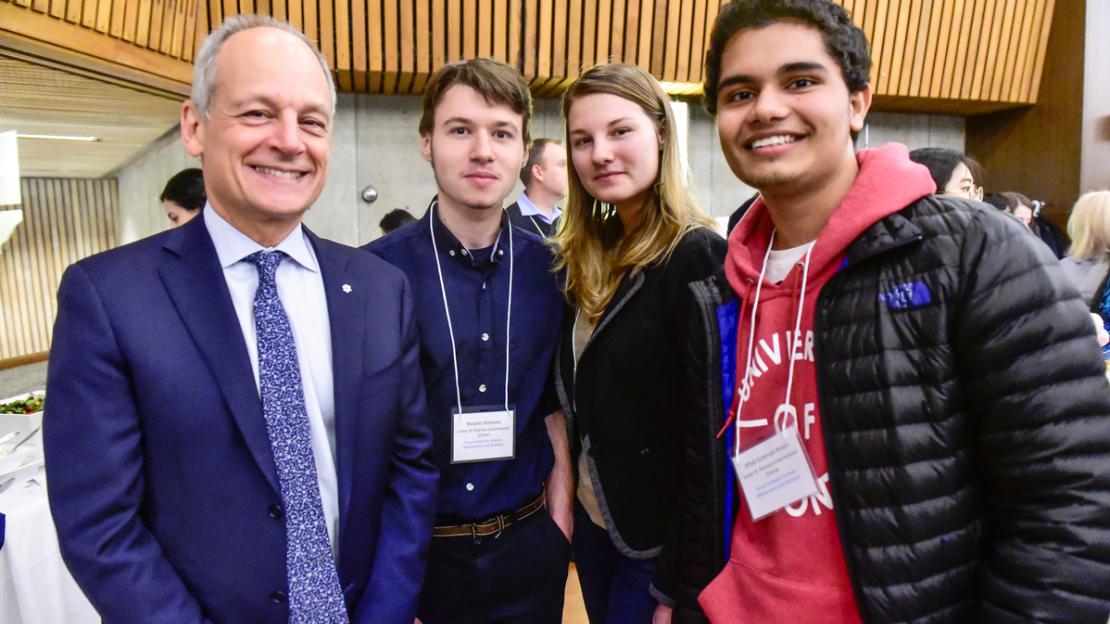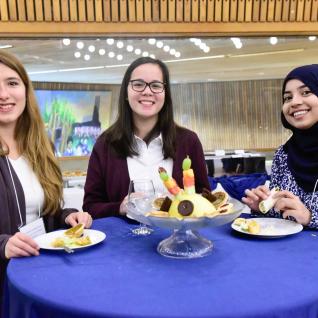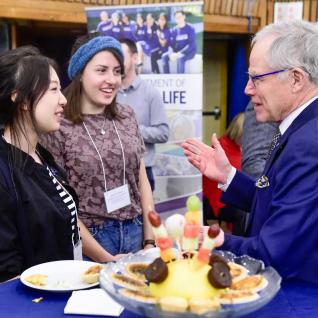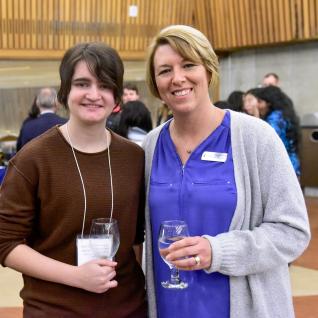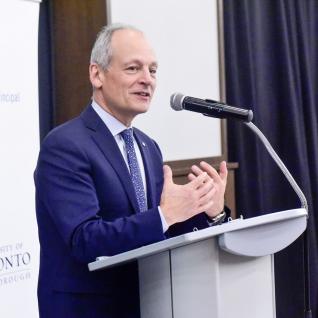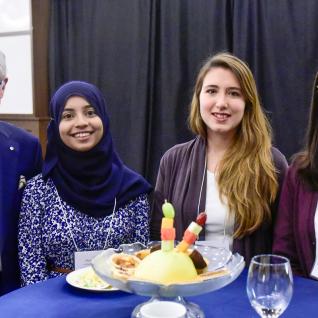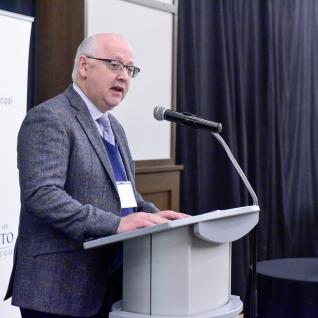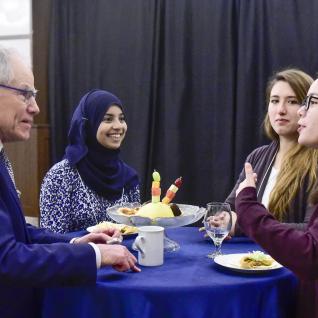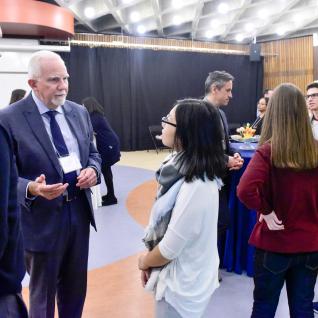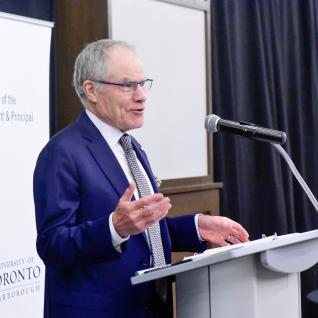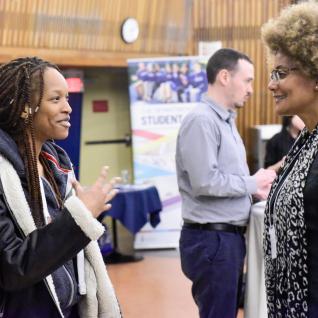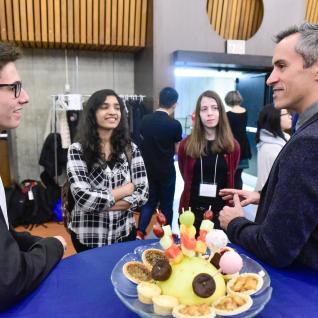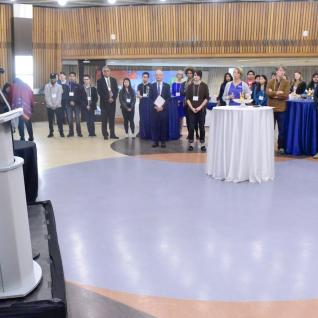U of T introduced its most prestigious scholarship for international students this year, and four of its winners are enrolled in Co-op programs at U of T Scarborough.
Lester B. Pearson International Scholarships were awarded to 37 students from around the world, including international students in Canadian high schools. As the scholarship program is fully implemented, it will eventually take 150 students annually.
“The winners will be contributing to our students’ understanding of what their home is, and vice versa,” says Curtis Cole, registrar and assistant dean enrollment manager. “The interchange of ideas of values of understanding is enormous.”
The scholarships aim to bring students with outstanding academic achievements, creativity and leadership skills to U of T. It particularly focuses on students that have impacted their schools and communities and who have potential to positively influence the global community.
The awards were officially handed out to students during a special ceremony attended by U of T President Meric Gertler on Nov. 13. The scholarship covers tuition, books, incidental fees and residence fees for four years. The students started studies at U of T Scarborough this semester.
Eiza Naveed
Eiza Naveed is from Abbottabad, Pakistan. She is entering a Co-op program for International Development Studies.
"U of T Scarborough promises uncertainty, and uncertainty for me is definitely an adventure," Naveed says. "I look forward to spending four years in Canada, a country that is so different from my own, meeting new people and exchanging meaningful conversations that will forever alter my perspective on life."
In 2015, Naveed's father died after he suffered cardiac arrest and could not be treated by one of the few local hospitals, due to a lack of adequate medical equipment. Inspired by her father, a physician who had treated impoverished people for free, Naveed then had the idea to implement a free, nonprofit first-aid unit and emergency centre in his name, Professor Dr. Naveed Irfan First Aid Unit. She worked with her family to create the only medical centre in a 10-kilometre radius, which has helped over 800 patients since March, 2016.
While interning at The City School Junior Branch, Naveed also created a month-long curriculum for students in Grades 4 and 5 to build confidence and concepts of self-worth. The program included group discussions, games and multimedia teaching tools to help students identify their talents, hobbies and ideas around improving the world. Students also shared stories of experiencing and overcoming bullying.
"I was concerned by my experience of seeing my peers feel less worthy if they didn't do well academically," Naveed says. “The program aimed to make every student feel acknowledged and confident."
At the beginning of the program, Naveed says only 25 per cent of students raised their hands to answer the question, "What are you good at?" By the end of the first session, at least 95 per cent raised their hands in each class.
As Head Girl at her high school, Naveed created and organized an event after reading several studies about a global increase in hate crimes motivated by xenophobia. Titled "Beaconhouse Global Fest," students were invited to explore and experience cultures from around the world by performing speeches, rap battles and dance competitions with the theme "Global Inclusion and Dignity." They also tried foods from different cultures.
"As racism and xenophobia have intensified in today's world, I was inspired to fight back with love," she says.
Ksenia Meteleva
Ksenia Meteleva is from Moscow, Russia. She will enter a Life Sciences Co-op program for Molecular Biology and Biotechnology.
In Russia, Meteleva first participated in a summer program at the School of Molecular and Theoretical Biology, which integrates select high school students into research labs. Last year, the program took her to Spain to research the neurons of drosophila, a species of fly, alongside internationally acclaimed scientists at the Barcelona Biomedical Research Park. She is returning to Barcelona for the same program this summer.
In Russia, Meteleva also volunteered at the Dmitry Rogachev National Research Сenter of Pediatric Haematology, Oncology and Immunology - Russia’s most advanced hospital and research facility for paediatrics. There, Meteleva made presentations about history, geography and ethnography and played educational and creative games with children with cancer.
“In modern times, humanity is facing many subversive global problems,” Meteleva says. “I thoroughly believe that all of these problems can be solved with the enormous advancement of international science.”
Meteleva first came to Canada in 2015 to attend Pearson College UWC in British Columbia, which she also attended through a scholarship. She is a member of the Pearson College Emergency Response Team, which trains students in first aid and firefighting, and has responded to campus emergencies. She now teaches CPR and defibrillator workshops to first year students.
Meteleva says that she is particularly excited about the Co-op element of her program.
“It will be so useful for me to explore the environment where modern scientists conduct their research and how they work, as well as better understand the areas I would be willing to focus on in the future,” she says.
Nicolae Stoncea
Nicolae Stoncea is originally from Chisinau, Moldova, but has studied in the United Kingdom since 2015. He is entering a Co-op program in Computer Science.
“While studying in the United Kingdom, the various cultures I encountered all had something I could learn from and make part of me,” Stoncea says. “U of T will give me the chance to meet people with opposing views, as well as understand problems concerning different people, which will allow me to tailor my projects to different cultures when leading teams that target global issues.”
Stoncea first began coding in 2015, when he created a project called SantaExpress. The project allowed parents to invite actors playing Santa to visit and hand-deliver presents. Stoncea used Google Maps and various computer algorithms to code their routes.
“I was entranced by computer science when I discovered its basis - a canvas where creative strokes can paint absolutely anything with enough time and effort,” he says. “As a problem-solver, it excites me that as I continue to improve my programming skills, problems turn into opportunities and challenges.”
In Moldova, Stoncea was founder and president of a club called Superhumans, which worked to help members become more confident. Twice per week, the club’s 40 members would do “Comfort Zone Challenges,” and interact with strangers in activities that intended to break them out of their comfort zones. Activities included pillow fights, dance-offs and exchanging compliments. Stoncea says he would be interested in establishing a similar group at U of T.
Stoncea says he chose U of T Scarborough for its Co-op program, and looks forward to working closely with others on a smaller campus.
“I can’t predict with certainty how U of T will develop me. What I do know is that the person that will graduate in four years will be completely different to the person answering this question today,” he says.
Aftab Hirani
Aftab Hirani will also be joining the Co-op program for Mathematics, Statistics and Computer Science. Hirani was born in India and grew up in Kinshasa in Democratic Republic of Congo. He now studies in Mombasa, Kenya.
"I want to be able to help as many people as I can during my lifetime, and coming to U of T will enable to me reach people from all over the world," Hirani says. "I will learn a lot about the different cultures and traditions of people and hopefully will be able to share the same with others."
Hirani learned to code at age 13. He has coded games and a database of statistics from his school’s sports teams. He also created a website and app for his father’s store.
In Mombasa, Hirani was part of a team that developed an open forum between youth and elders to encourage community interaction. He has also worked in cleaning areas of the city to prevent the spread of malaria and cholera.
Hirani founded and led a service project called Young Activists in Mombasa. The project worked to give students computer access at local schools. It also taught students computer literacy skills, and included a focus on social media use as a means of creating awareness and communication around local issues.
"I want to be able to give back to the community in Kinshasa and, more broadly, to Congo," Hirani says. "I believe the best way to do so, while enjoying what I do, is through computer science."
Hirani is also a member of his school’s basketball team, which is ranked fourth in Kenya. He says he intends to join the basketball team at U of T Scarborough.
